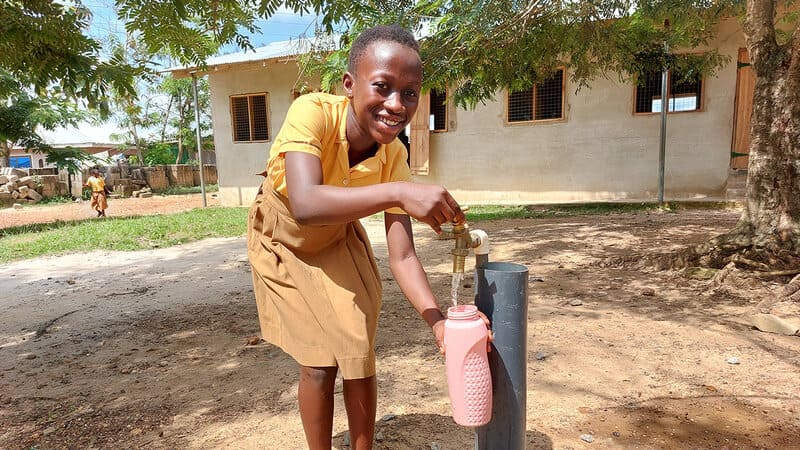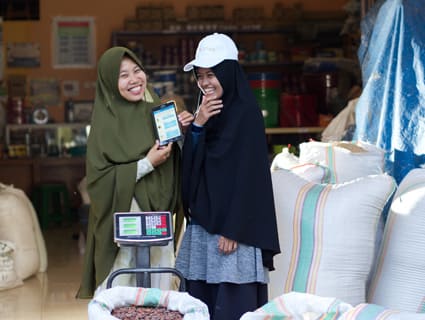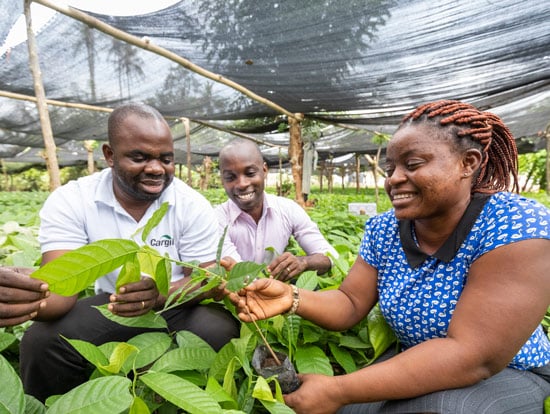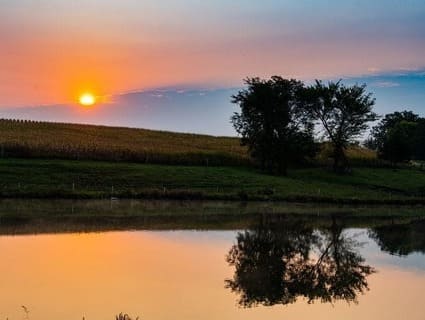Ripple effects: Connecting farmers and communities with safe, clean water
Read Time: 4 minutes
March 21, 2023
For Stephen Akubila, finding safe, clean water was a big challenge.
In the 48-year-old cocoa farmer’s southwestern Ghana community, most of the boreholes for accessing water had broken down. The few that remained didn’t supply enough for the entire community.
So, every day, Stephen would walk long distances with his family for water — and then carry it back to their home. That meant less time to focus on growing healthy cocoa plants, limiting his yields and his ability to provide for his family of seven.
“It was difficult to nurture my cocoa seedlings, as the nearest water access point was far away,” Stephen says.
Water challenges like these are all too common in farming communities throughout the world, including in the cocoa growing regions of West Africa. That is why Cargill is finding innovative ways to connect farmers like Stephen and agricultural communities to safe, clean sources of water.
It is part of the local approach we take to help address this complex global issue, says Isabel Dimitrov, Cargill’s corporate responsibility manager for Europe, the Middle East and Africa.
Agriculture has a critical role to play in ensuring water and food are sustainable. Because we are at the heart of the food system, we are uniquely positioned to deliver scalable solutions — bringing together a broad range of stakeholders to address local water challenges.”
One example: Cargill Currents, where we are working with the Global Water Challenge and local organizations like Water & Sanitation for the Urban Poor to improve water access for up to 150,000 people in Ghana, Brazil, Cameroon, Côte d’Ivoire and India by 2024.
Through the program, we helped bring a mechanized water supply system to the Nzema Nkwanta community where Stephen lives and farms.
Today, residents use the water supply system to access safe water from their homes and businesses. As well as clean drinking water, they have an established water management committee. And Stephen has more time and resources for his cocoa farming business — the primary income stream for his family.
“I will be able to nurse more seedlings at home and easily transport and plant them in my farm,” Stephen shares. “Thanks to the project, this will assist me greatly in expanding my farm, and to produce higher yields and improve my income levels.”
|
Water, by the numbers
Learn more about Cargill’s water strategy. |
|---|
 Obaa, a 12-year-old girl in Ghana, used to have to fetch water for her school. Through our partnership with the Global Water Challenge, Cargill helped provide a water well on her school grounds, helping students like Obaa to focus on their education.
Obaa, a 12-year-old girl in Ghana, used to have to fetch water for her school. Through our partnership with the Global Water Challenge, Cargill helped provide a water well on her school grounds, helping students like Obaa to focus on their education.
Water’s ripple effects
Obaa’s school in Sefwi Bekwai, Ghana, had no running water.
Each morning, the 12-year-old and her classmates would carry heavy loads of water to school for drinking and basic hygiene purposes. But the water would rarely last the day.
There were instances where water ran out during lessons, and we had to stop learning so we could get water for use in the school. This was affecting our studies as we missed classes to fetch water, and often found ourselves behind because we had missed important parts of the lessons. This was very discouraging, and I sometimes lost interest in going to school.”
That is, until the community installed a new water well on the school grounds — providing the schoolchildren access to safe, clean water as part of our Cargill Currents partnership.
Access to safe, clean water can have ripple effects for communities — such as improved community health and livelihoods, greater resilience against the effects of climate change and progress in women’s empowerment.
“Creating meaningful change involves identifying the interconnectivity of issues,” Isabel says. “By addressing water challenges in a holistic manner, we can achieve positive effects for an entire community. For example, when a community has access to safe, clean water, we often also see improvements in water-smart agriculture, community infrastructure, farmer livelihoods, education and gender equity.”
And as for Obaa’s education? She became a full-time student again.
“Now that we have proper water supply in our school, I am happy,” Obaa says, “because I can now concentrate on my studies and not worry about fetching water.”
More stories
Global challenges, local solutions. When it comes to water, Cargill — and agriculture — is ‘holding the key.’
Cargill’s global sustainability director for water explains how.

‘If you want to go far, go together’: 10 ways this African proverb sums up a decade of progress for cocoa communities
Cargill’s global sustainability director for our cocoa and chocolate business reflects on 10 years of the Cargill Cocoa Promise.

Connected for more
From farmers to communities, learn how we are bringing together the people who can help the cocoa sector thrive.

